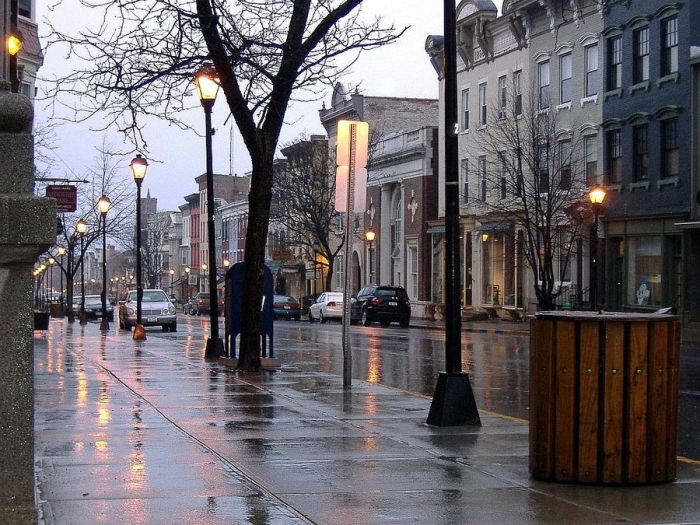The City of Hudson is re-imagining its streets and sidewalks to allow businesses to operate and people to socially distance during the COVID-19 pandemic.
The ambitious plan calls for Warren Street – where the vast majority of the city’s businesses operate – to be shared by pedestrians and local vehicle traffic below Seventh Street on weekends. Most parking spaces on Warren Street would be occupied by city businesses and nonprofits seven days a week.
The idea is to allow storefronts in the city, many of which are too small to allow for social distancing, to expand outdoors, and for the sidewalks to spread onto Warren Street on the weekends so pedestrians can keep their six feet.
Peter Spear, the creator of FUTURE HUDSON and one of the plan’s designers, said during an interview the plan was good for Hudson in two ways.
“Our heath depends on the best use of the space that we have – both physical health, like stopping the spread of the virus, but also clearly the economic health of the city depends on giving businesses that same space to operate,” he said.
Forty percent of businesses in Hudson are at the risk of collapse due to the COVID-19 shutdown, according to the Hudson Hospitality Taskforce.
Slumping sales and the potential closing of businesses would also gravely impact the city’s sales tax revenue and other sources of income.
Non-property tax revenues for the city could fall between 10 and 23 percent for the year, according to a report by the city treasurer.
The “shared streets” plan was presented to the city during a virtual town hall on Thursday, where the designers – all but one city residents – and Mayor Kamal Johnson answered emailed questions.

A still from Hudson’s shared streets presentation.
The presenters emphasized the plan had been put together with great speed and alterations would still be made and details fine-tuned. The city will have a “trial weekend” starting June 19 to see what improvements have to be made, according to Kaja Kuhl, an urban planner from the Columbia University Graduate School of Architecture, Planning and Preservation who helped develop the plan.
“It’s our goal to be very nimble during the test phase,” she said.
Under the current plan, establishments would occupy most parking spaces on Warren Street at all times, with barriers between the spaces and the road. Handicap spaces and areas in front of fire hydrants would stay as they are. On Fridays, Saturdays and Sundays during the day, Warren Street would be closed to all vehicular traffic except motorists going somewhere on that block. The speed limit would be 5 MPH, and business owners would be encouraged to receive deliveries from the rear of their buildings, in the city’s vehicle-accessible alleys.
Responding to a question about pedestrian safety, Kuhl said she had grown up on a shared street.
“It relies heavily on all participants in the street looking out for each other,” she said, including drivers making eye contact with pedestrians on the road.
“Slowing down and being able to react to that eye contact is critical,” Kuhl added.
Several of the questions asked during the virtual town hall had to do with who would get which parking spaces.
Responding to a question about residential parking on Warren Street, Hudson Hall General Manager and project developer Page Carter said the planners were looking into directing people living on Warren Street to park in lots elsewhere in the city.
“It’s true that this plan will disrupt a number of parking spaces on Warren Street,” she said. “There’s no way around it.”
Businesses on the street are already associated with particular parking spaces, Carter said, and businesses could apply for additional spaces, with establishments elsewhere in the city also allowed to apply.
“It’s going to require we all work together to be fair and equitable,” she said.
Tambra Dillon, executive director of Hudson Hall and one of the project developers, said during an interview businesses would apply for spaces through the Hudson Police Department, which handles closing parking spaces for the city, thought the department would not arbitrate who received which space.
There were a dozen-or-so situations that “require some sort of yenta process” to decide who gets what space, she added.
“There’s going to be some hiccups” during the test weekend, Dillon said, but they would allow planners to see what to alter and where to improve. The City was not looking to promote its new shared streets plan to traditional tourism markets so city businesses would have time for a proper roll-out.
Hudson is not the first city to introduce shared streets.
In Europe, the concept – called woonerf, Dutch for “living street” – can be found in the Netherlands, England and Sweden, according to CityLab.
American cities have begun embracing the idea as they begin to reopen during the pandemic. On Long Island, Greenpoint is experimenting with the idea, and Riverhead is planning to, according to Newday.
The City of Hudson, with a population just over 6,000, has had 33 confirmed cases of COVID-19 as of June 5, according to the Columbia County Department of Health (DOH). At least 37 people have died in the county, according to the DOH, but the department does not provide the towns of the deceased.



